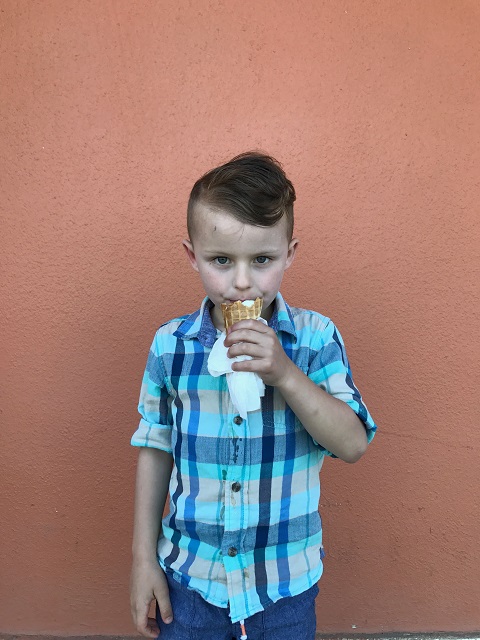
“Who we are and how we engage with the world are much stronger predictors of how our children will do than what we know about parenting. In terms of teaching our children to dare greatly in the “never enough” culture, the question isn’t so much “Are you parenting the right way?” as it is: “Are you the adult that you want your child to grow up to be?” ~ Brené Brown
~
“How fun! You got a birthday party invitation to an amusement place with an arcade and bowling,” I told my son.
He looked at me sideways and asked, “Whose party is it?” I told him, and he said, “No, I’m not interested.” I was surprised. I found myself trying to convince him that this would be such a fun party, and how nice it would be to reconnect with an old friend. He eventually caved in and agreed to go.
The day of the party arrives, and as we go in, he sees some friends he feels connected with and seems to be having fun. Then the birthday boy’s mom comes around gathering up the guests for a game of bowling. My son comes up to me and says, “Okay, Mom, I’m ready to go.”
I find myself trying to convince him to stay, “But you are having so much fun…why don’t you go bowling with your friends? We just got here. It’s not nice to leave a birthday party so early.”
He says no, but I still don’t listen. He ends up escalating his no into a yell, and it gets to a point that I need to take him aside. Eventually, we apologize to his friend’s mother who kindly replies, “They are kids. Kids are complicated. Don’t worry, we’ll set up a time for them to play another day.”
The truth is that my son has never been a big fan of large parties. Still, all these years, I’ve been trying to convince him to enjoy birthday parties. Why? Because I do. I have often found myself saying: “You’ll have fun!”—and: “Your friend invited you so it’s important you go!” But then, we’d get to the parties, and he’d either refuse to go in or decide he wants to leave. If he didn’t want to “comply,” he’d have a tantrum—but he was starting to get past the age where it was “expected” or “age appropriate” to have them.
I felt judged. I felt shame. I felt embarrassed. I thought, “What am I doing wrong? Why can’t he have fun with the other kids? What’s wrong with him?” And the most common thought, “What will the other parents think of us or think of him?” Other people’s feelings and opinions were starting to matter to me more than my own son’s.
We left several parties feeling awful. What was supposed to be a good time turned into what Brené Brown calls a “shame storm”—my son’s and my own. However, once I practiced taking a mindful breath and becoming more present and aware of what was happening, I reset the tone. I took ownership of my part in the lashing out, which was not listening or respecting my child’s preferences. After all, was this my friend’s party or my invitation to accept?
Then, I had to help him understand he also has some responsibility for how he chooses to show his emotions. And there are still consequences when he misses the mark now, but unlike the past, they’re done with loving-kindness instead of generating more feelings of shame or unworthiness.
He is loved. He doesn’t have to conform or be like everyone else. He has his own preferences, needs, and opinions, and they matter too. I want to model that it’s okay to say no, and it’s okay to leave something early if we need to. We can make a gracious exit, rather than a dramatic one.
I admit that over the years, I have not been too patient or compassionate, and I’ve tried to make my son conform to my own needs and wishes. I can see this now. I didn’t see it back then. Brené’s message rings so true to me. I love what she says about wholehearted parenting and trying to be compassionate with ourselves to build shame resilience in ourselves and our children, so that we feel worthy of love and belonging.
I’m trying to remind myself of this on a daily basis, so I can relax a bit and let go of expectations for others. I want to honor what’s true and right for myself and my children. It’s taking time, but each day, I become more aware of how my behavior is impacting my kids—and I’m awakening to a completely new and different way of relating to them. One day at a time, I’m letting go of trying to be a perfect parent and working on being a present one.
This is my “compassionate parenting” manifesto:
To me, compassionate parenting means practicing forgiveness every single day (and even moment to moment) with ourselves and with our children. It means responding kindly when our kids are struggling or behaving in ways that are “difficult.” It means allowing space for mistakes to happen while letting them know they are still worthy of love and belonging. When we are compassionate, we separate who they are at the soul level from a behavior that doesn’t meet our expectations.
We model and provide gentle guidance, instead of using harsh words or punishment which only strips away their self-worth. We practice what I call compassionate boundaries with them. It means providing a safe space in the relationship to explore and work through all of our emotions—especially those that are difficult.
Compassionate parenting is also about learning to take good care of ourselves, so we can then care for our children without becoming resentful toward them or worn out. We are not only forgiving of them, but we also forgive ourselves for not doing it “right” all the time or not being perfect at it. We are able to let go of unreasonable and unrealistic expectations and just be present in body, mind, and spirit. We let them know we are here, and we will never abandon or give up on them. We believe in them, and we believe in ourselves.
Compassion helps us to positively inspire our kids to make healthy long-lasting changes in their lives while we do so in ours. Compassion is not demanding, critical, or judgmental. It is accepting, loving, and kind. When we treat ourselves with compassion, we can then extend that practice to those around us, which helps all of us flourish.
What is your compassionate parenting manifesto? What are some of your daily parenting struggles, and how do you cope? I would love to hear!
~
Relephant:
3 Mindful Parenting Tips that can help us Connect with our Children.
17 Parenting Wins & the Things I wish I had Done.
~
Author: Sofia Reddy
Image: Unsplash/Society Rebel
Editor: Yoli Ramazzina
Copy Editor: Travis May


 Share on bsky
Share on bsky




Read 18 comments and reply